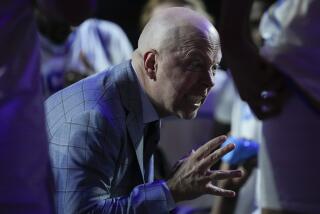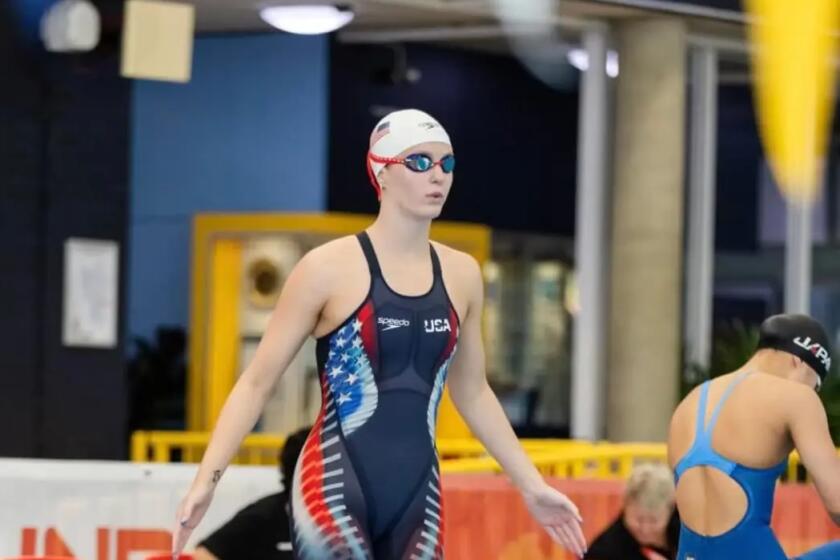Courson pointed to NFL steroids
- Share via
In the months before his death in 2005, former NFL lineman Steve Courson wrote a 5,000-word letter expressing disappointment that more players weren’t open about their steroid use and saying the league’s enormous popularity relies on a “myth” of its players as drug-free heroes.
“I believe the NFL is a prisoner to their own public relations myth,” Courson said in the letter, which was found on the computer of his western Pennsylvania home after he was crushed to death at age 50 by a tree he was cutting down.
“The level of deception and exploitation that the NFL requires to do business still amazes me.”
Frank, personal and philosophical, the letter amounts to a treatise from the grave.
“Steve deserves this chance to continue to speak and it was a godsend in a way to get this,” said friend and author Matt Chaney, who says he plans to quote from the document in a book titled “Spiral of Denial: Muscle Doping in American Football,” due out next year.
Courson, who became one of professional sports’ first steroids whistle blowers by detailing his use in a 1985 Sports Illustrated interview, wrote the letter to a former Pittsburgh Steelers teammate he played with on Super Bowl-winning teams in 1978 and 1979. Chaney believes Courson never sent it because it was unfinished.
Chaney provided the letter to the Sun on condition that the intended recipient not be publicly identified. Chaney and others said it was not Courson’s goal to ruin retired players’ reputations, but to look broadly at steroid use in sport.
“He was upset at the fact that these guys wouldn’t come clean for him,” said Denise Masciola, who was Courson’s girlfriend. “But if Steve really wanted names to be mentioned, he would have done it. He didn’t.”
In the letter, which was authenticated by Masciola, Courson suggested that many current and former players are, in effect, living a lie by denying their use of anabolic steroids and other performance-enhancing drugs. He said they were pawns to a sport that continually required them to be bigger, stronger and faster.
“It’s not complicated, either you behave like a stand-up person or you don’t,” he wrote. “Finally, I guess it gets down to whether or not we want to be remembered historically for being stooges to the myth or for being freed by the truth.”
Courson’s letter focuses more on his era than the present day. But he said steroid use had persisted.
“In the old days when we played, the drugs were legal and penalties for use were non-existent,” he wrote. “The more size and strength played a role in your job the more pressure there was to use, plain and simple.”
Courson, who studied steroid use and effects after his retirement from football in 1985 and testified before Congress six months before he died, said use of the muscle-building drugs continued as players competed for increasingly lucrative salaries. The league has become more popular and prosperous than ever.
The NFL began disciplining players for steroid use in 1989. Random, unannounced testing began in 1990.
“This continued clandestine use is due to the fact that the rewards are greater and the performance demands are the same,” Courson wrote.
Apprised of Courson’s main points, NFL spokesman Brian McCarthy this week defended the league’s steroids testing policies.
“We have had year-round random testing with immediate suspensions since 1990 and we conduct approximately 12,000 steroids tests a year,” McCarthy said in an e-mail. “We will continue to maintain a strong and effective drug testing program.”
Former quarterback Terry Bradshaw, a Courson teammate, recently told Sports Illustrated’s Dan Patrick in a radio interview that he used steroids but later said he was referring to corticosteroids, which reduce inflammation.
One Steeler of Courson’s era, running back Rocky Bleier, has said he took legal, prescribed steroids but didn’t abuse them. Most other players have stayed silent, and a few have questioned Courson’s claims.
“It is interesting other than me only Rocky Bleier is on record about his steroid use during the Super Bowl years. He came out right after I did Sports Illustrated in 1985,” Courson wrote. “He was backing me up. I won’t ever forget that.”
In 2006, Washington Redskins offensive tackle Jon Jansen said on the HBO program “Costas Now” that perhaps 15% to 20% of NFL players use illegal performance-enhancing drugs. He later backed off the statement. The NFL suspends players a minimum of four games without pay for testing positive to a banned substance.
As a player, Courson had 20-inch biceps and could bench press 600 pounds. He was 6 feet 1 and close to 300 pounds. His teammates said Courson once embarrassed running back Franco Harris by beating him down the field on a run.
After his NFL career ended, Courson was a motivational speaker, health and fitness educator and youth football coach.
He almost died in 1988 from an enlarged heart and related problems. But he wrote in his letter: “I have regained my health, conquered my addictions and re-affirmed my faith. The part that is upsetting to me is the realization now that I had to defend myself for almost 20 years for telling the absolute truth.”
More to Read
Go beyond the scoreboard
Get the latest on L.A.'s teams in the daily Sports Report newsletter.
You may occasionally receive promotional content from the Los Angeles Times.










